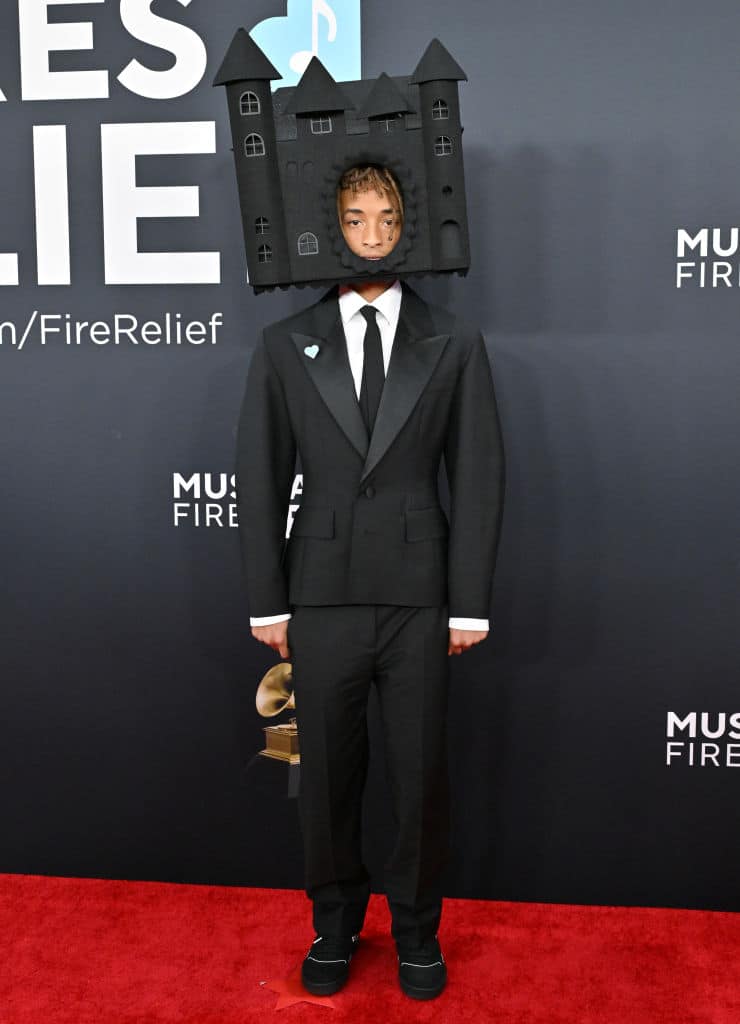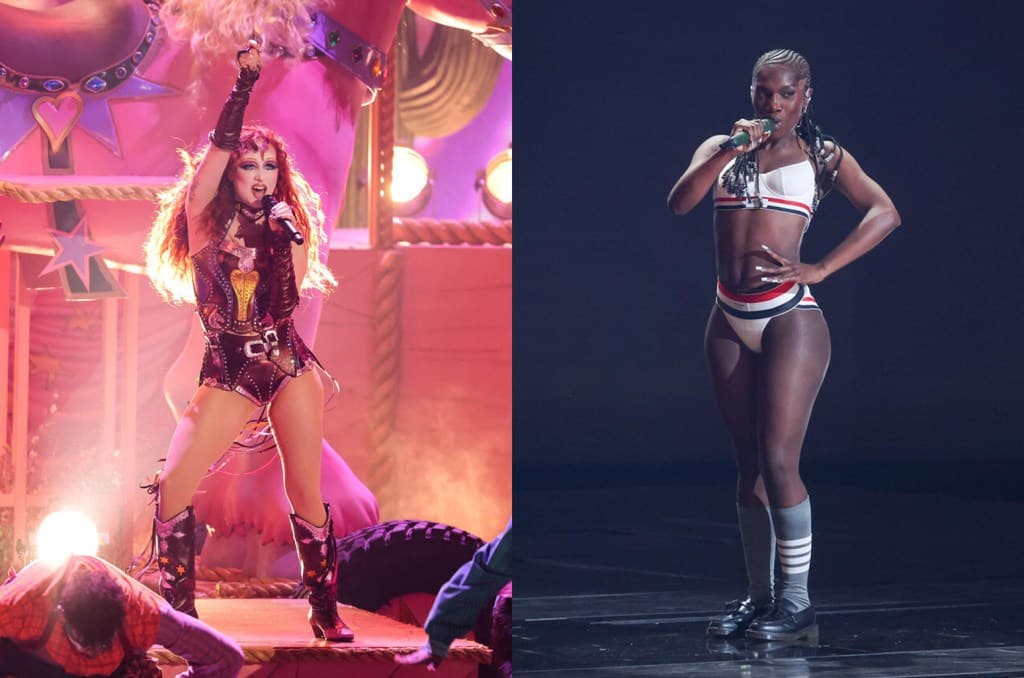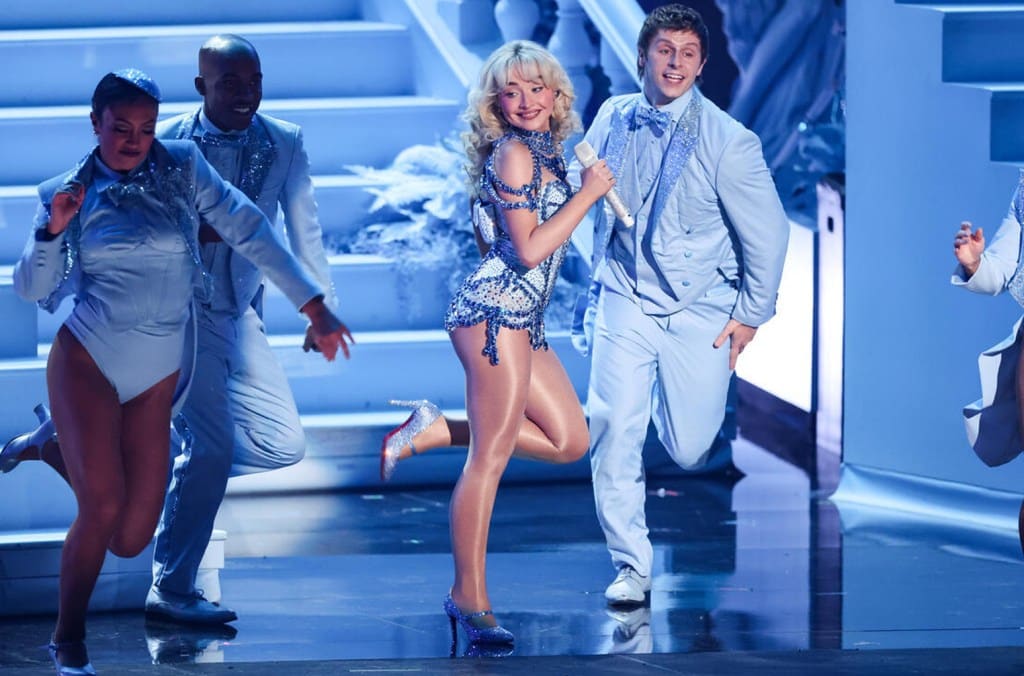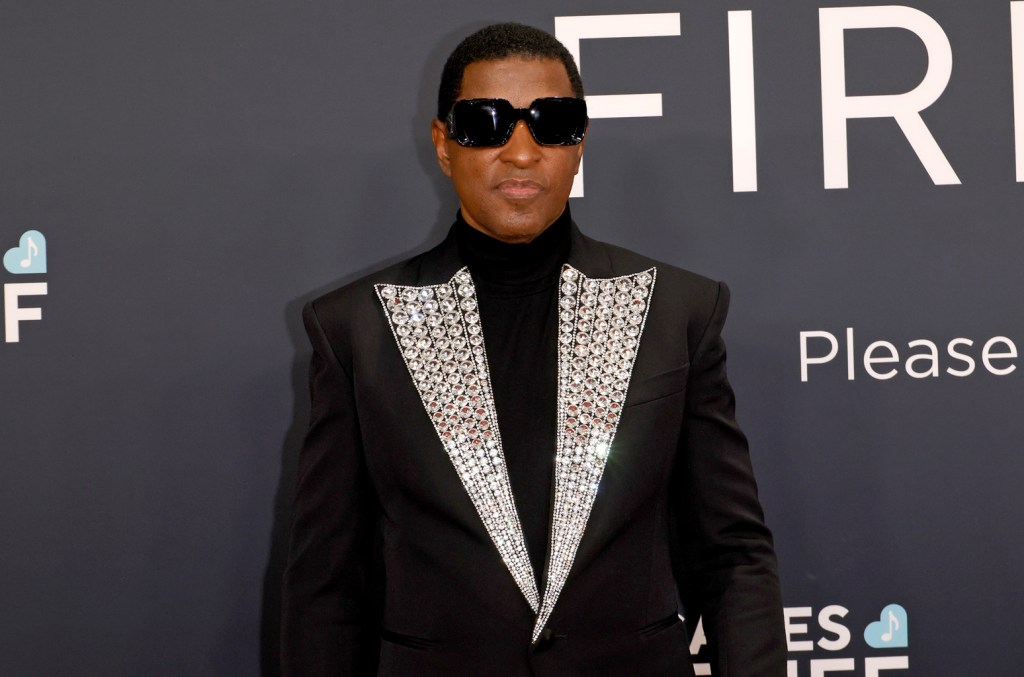Grammys
Page: 8
HipHopWired Featured Video
Source: Axelle/Bauer-Griffin / Getty
The 2025 Grammys red carpet was a playground for bold fashion statements, especially from the rappers who showed up to steal the spotlight. Kanye West, ever the controversial figure, turned heads with his unconventional look alongside his “naked” boo, Bianca Censori. Kanye, known for pushing boundaries, kept it typically understated but intentionally strange—draped in an all black outfit, while Bianca, had to match the “no rules” theme. It felt like a statement of raw minimalism, with their odd but eye-catching energy capturing everyone’s attention.
Jaden Smith, another fashion wild card, was at it again with a look that screamed high fashion. Sporting a head piece that looked like a castle. Jaden’s outfit seemed to be the most left field outfit on the red carpet. Smith was a living, breathing work of art that blurred the lines between fashion and performance.
Overall, the Grammys red carpet is basically a runway for self-expression, where celebs don’t just dress to impress—they dress to make a statement. It’s a place where boundaries are pushed and fashion is used as a form of art. The red carpet feels like a reflection of celebrities personalities —where style is personal and unique. The outfits seen on the carpet often mix bold streetwear elements with high fashion, creating a look that’s all about confidence and individuality. There’s no fear of breaking norms; in fact, the more daring, the better.
What makes the red carpet outfits so special? It’s all about not following trends—it’s about setting them. It’s a reminder that you can wear what feels right for you, express your personality through style, and stand out from the crowd. Whether it’s through oversized silhouettes, unexpected materials, or fierce accessories, the red carpet is a place where everyone can let their true selves shine.
Check out our full list rating some of our favorite artist looks at the 2025 Grammy’s:
All products and services featured are independently chosen by editors. However, Billboard may receive a commission on orders placed through its retail links, and the retailer may receive certain auditable data for accounting purposes. What a weekend for Sabrina Carpenter. After picking up her first pair of Grammys — best pop album for Short n’ Sweet […]
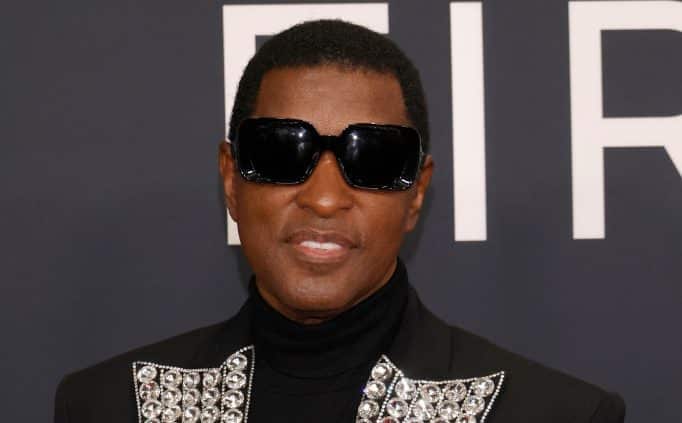
HipHopWired Featured Video
CLOSE
Source: Frazer Harrison / Getty / Babyface
The Associated Press had to apologize to Babyface following some blatant disrespect on the Grammys’ red carpet.
Reporters for the Associated Press, Leslie Ambriz and Krysta Fauria, had to apologize after social media, specifically the Black delegation, expressed dissatisfaction with how they treated the legend, Kenneth “Babyface” Edmonds.
Ambriz and Fauria were initially talking to Babyface but quickly lost interest in the iconic singer/songwriter when Chappell Roan appeared behind him.
Babyface quickly noticed the disrespect, telling the two thirsty reporters to interview Roan, “You guys wanna do that? Go do that,” before handing them back the microphone and walking off.
The outrage on social media was instant. Dionne Warwick said on X, formerly Twitter, “13x Grammy Award-winning Kenneth ‘Babyface’ Edmonds? Am I seeing this correctly?” and followed that up with a screenshot of the dictionary definition of the word “decorum.”
You know it’s bad when culture vulture Khloe Kardashian calls you out.
The Associated Press Apologized
The fallout was so bad that the Associated Press apologized to Babyface for the two reporters’ behavior.
“We are deeply sorry for cutting our interview with Babyface short on our YouTube livestream of the Grammys red carpet. We have apologized to him through his representative and to our viewers on the live stream,” AP’s post reads.
Folks on X aren’t accepting the apology. One person wrote in response to the AP, “Girl [middle finger emoji] you and this fake ass apology. Next time hire some real reporters and not dumb fangirls to conduct the interviews.”
Damn.
Still, it was an epic night that saw Kendrick Lamar sweep every category he’s in and cement “Not Like Us” as the greatest diss song ever, Doechii bring home a Grammy for the rap girlies, Beyoncé win “Best Country Album,” and the elusive “Album of The Year,” and Janelle Monáe piss off Michael Jackson fans.
You can see more reactions in the gallery below.
2. Very true
3. Shawn Stockman from Boyz II Men with a message
4. Well deserved
When accepting the award for best pop duo/group performance at the 2025 Grammys on Sunday night (Feb. 2), Lady Gaga — the pioneering pop performer known across the globe for her unflinching advocacy on behalf of the LGBTQ+ community — shared her spotlight with a community in desperate need of affirmation.
“Trans people are not invisible. Trans people deserve love,” she declared. Cameras cut into the audience, showing nods of approval and acknowledgement from music’s biggest names, including Billie Eilish, Beyoncé and Charli XCX. “The queer community deserves to be lifted up. Music is love.”
Trending on Billboard
In almost any other year, Gaga’s declaration would be seen simply as another example of the singer’s ongoing support for the community that helped give her the platform she occupies today. But in 2025, her statement was just one of a chorus of voices — predominantly queer ones — reminding the audience at home that for some communities, existence itself is currently at stake.
The 2025 Grammys received plenty of attention this year for an undeniably queer slate of nominees and performers, and Sunday’s ceremony proved to be one of catharsis and joy for the community. Queer artists stepped up to the plate to combat the onslaught of anti-LGBTQ+ rhetoric and legislation being spread across the United States and the world at large with defiant joy and unparalleled affinity.
That outpouring of love and support could not come at a more crucial moment; in the 14 days since he took office for a second term, President Donald Trump has effectively codified his backwards, bigoted views on LGBTQ+ people into a series of regressive executive actions.
He denied the existence of trans, non-binary and intersex people by declaring that the United States government will only recognize two sexes. He revoked federal mandates for workplace protections that prevent marginalized communities — including queer and trans folks — from being discriminated against. He attempted to ban trans people from serving in the U.S. military again. He ordered to end any and all federal funding for gender-affirming care. He targeted trans students and schools that support them. His actions led the Centers for Disease Control and Prevention to temporarily remove online health resources for the LGBTQ+ community. Emboldened right-wing lawmakers around the country have announced their desire to have the Supreme Court reverse their landmark ruling legalizing same-sex marriage.
To put it plainly: The current right-wing political ecosystem, led by Trump’s administration, is attempting to erase the LGBTQ+ community from participation in public life, starting with trans and gender-diverse people.
Before the Grammys began in earnest on Sunday, artists were already calling out the ongoing attacks on trans people. Speaking to GLAAD on the red carpet, soon-to-be best new artist winner Chappell Roan laid out, in no uncertain terms, her support for the trans community.
“It’s brutal right now, but trans people have always existed and they will forever exist, and they will never, no matter what happens, take trans joy away,” the singer said. “That has to be protected more than anything, because I would not be here without trans girls. So, just know that pop music is thinking about you and cares about you, and I’m really trying my best to stand up for you in every way I can.”
Roan doubled down on that support later on in the awards show. Despite her breakout hit “Good Luck, Babe!” being nominated across multiple categories at the ceremony (including record and song of the year), the Midwest Princess instead opted to perform her generational LGBTQ+ anthem “Pink Pony Club.” Surrounded by rodeo clowns, kitschy outfits and a giant rose-colored horse, Roan let the crowd accentuate the point of her song with a loud sing-along at its final chorus. Chappell, and the LGBTQ+ community at large, will “keep on dancing,” come what may.
Roan was just one amongst a crowd of LGBTQ+ stars who dominated the awards on Sunday evening. After becoming the second-ever queer Black woman to take home the best rap album award at the ceremony (Cardi B made history with her win in 2019 for Invasion of Privacy), breakout star Doechii dedicated her win to all the Black girls watching at home, promising them that no president could take their shine from them, even if our current one has his sights set on eliminating DEI programs across the federal government.
“Don’t allow anybody to project any stereotypes on you, that tell you that you can’t be here, that you’re too dark or that you’re not smart enough or that you’re too dramatic or you’re too loud,” she said. “You’re exactly who you need to be to be right where you are.” Earlier in the evening, Doechii made sure to call for the industry to bring “more gay artists” into the fold in the coming years.
In a backstage interview after her three rock category wins, St. Vincent added to the voices calling for greater LGBTQ+ representation across the board. “There have always been queer people in the history of the world, and especially in music,” she told a reporter. “There’s a bunch of queer people being celebrated this year. And that’s great, of course it’s great — empathy and humanity, let’s go.”
That’s not to say that the Grammys had a perfect run in 2025. As in years past, the annual ceremony had a distinct lack of trans artists present amongst the nominees — though writer/producer Ariel Loh, the first openly trans Asian-American woman to win a Grammy (in the Harry Belafonte best song for social change category, for Iman Jordan’s “Deliver”), made sure to use her limited screen time properly, calling on the audience to “protect trans kids.”
Cynics could shrug off the overt queerness of this year’s ceremony as an inconsequential blip in an unprecedentedly dangerous time for the LGBTQ+ community. But data shows that events like the Grammys are more impactful than some critics are willing to admit.
A 2022 study by the Trevor Project showed that nearly 80% of LGBTQ+ youth reported that seeing musicians come out as LGBTQ+ made them feel better about their own identities. Over 70% felt the same way when they saw straight, cisgender celebrities advocate on their behalf. Compare that to the organization’s study from last year showing that 90% of all LGBTQ+ youth surveyed said recent legislative attacks on queer and trans rights had a direct, negative impact on their well-being.
“When LGBTQ+ young people see themselves reflected and celebrated on a global stage like the Grammys, it sends a powerful message that they belong, their experiences matter, and that they can succeed in spaces as their true, authentic selves,” said Kevin Wong, the Trevor Project’s senior vice president of marketing, communications and content, in a statement shared with Billboard. “Queer visibility in the media also plays a key role in reducing stigma and combating stereotypes surrounding LGBTQ+ people. We are a vibrant and creative community, and we deserve to have our voices heard, our accomplishments celebrated, and our existence validated.”
With unequivocal bigotry working its way into mainstream conversations of queerness and transness once again, LGBTQ+ artists made certain on Sunday night that queer and trans kids watching at home knew that what’s happening now is not normal, nor should it be accepted as such. They reminded the audience watching that it is everyone’s responsibility to fight back against the rising tide of transphobia.
And to lawmakers aiming to relegate LGBTQ+ people to the outer margins of society, those same artists offered an explicit message underlined only by their success at the annual ceremony: We’re not going anywhere.
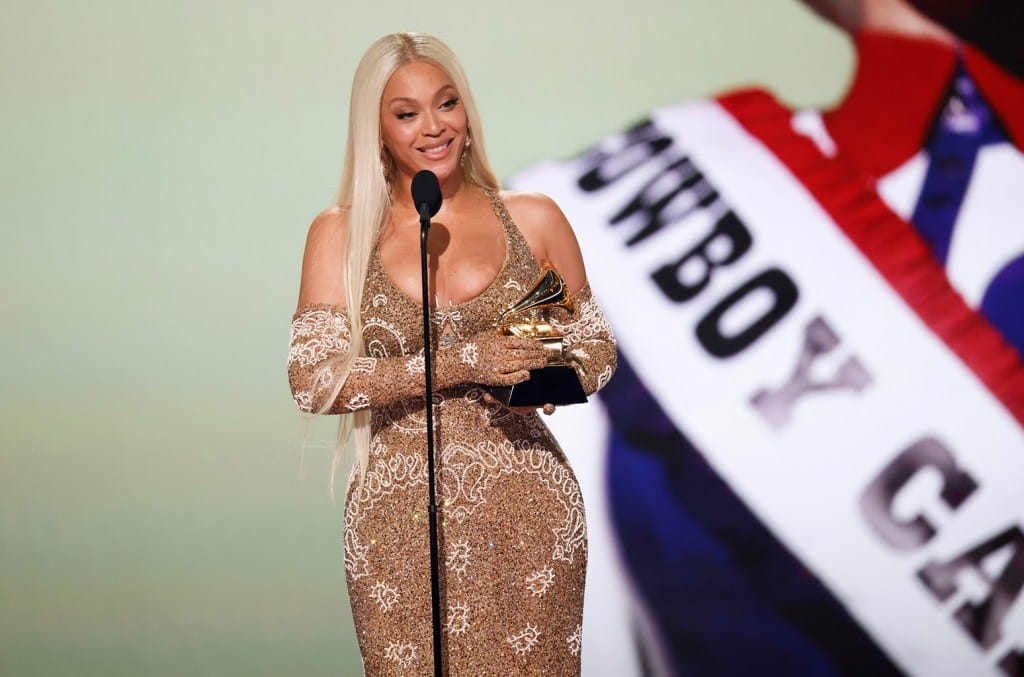
When Captain Sheila Kelliher Berkoh announced Beyoncé’s Cowboy Carter as the winner of album of the year at the 67th Annual Grammy Awards (Feb. 2), the rapturous standing ovation that swept across Crypto.com Arena seemed to say one thing: Finally.
After five previous bids over the past decade and a half, Beyoncé finally took home album of the year for the second history-making entry in her still-unfurling trilogy that commenced with 2022’s Grammy-winning Renaissance. As Queen Bey embraced her eldest daughter, Blue Ivy Carter (already a Grammy winner in her own right), and began to make her way to the stage, the room rejoiced. Lady Gaga and Billie Eilish wept, Cynthia Erivo leapt up and down, Taylor Swift shared a toast with Jay-Z, Olivia Rodrigo cheered and GloRilla screamed till she damn near couldn’t anymore. At long last, the First Lady of Music – as dubbed by one Clive Davis – had finally won the industry’s most coveted prize.
With her victory, Beyoncé not only extended her lead as the most-awarded artist in Grammy history (35 wins), but she also joined Natalie Cole (Unforgettable With Love, 1992), Whitney Houston (The Bodyguard, 1994) and Lauryn Hill (The Miseducation of Lauryn Hill, 1999) as just the fourth Black woman to ever win album of the year. It’s that nugget of history, coupled with her litany of egregious General Field snubs that made this moment such a sweet one to witness.
Trending on Billboard
But let’s be careful not to let “overdue” narratives completely obfuscate the artistic merit of Cowboy Carter. Leading up to last night’s ceremony, many publications – including Billboard – predicted that Cowboy Carter would take home top honors. Across social media and some of those pieces, narrative started to build that a Cowboy Carter victory would be like Leonardo DiCaprio winning for The Revenant or Martin Scorsese winning for The Departed – or like Beck winning for Morning Phase in 2015, the year of Bey’s first major album of the year loss. After being passed over for what many consider to be their best efforts, acclaimed artists who consistently produce the best work in their respective industries finally earn the highest honors in their field. In the same way that DiCaprio is an actor’s actor and Scorsese is a director’s director, Beyoncé is an artist’s artist. That much was clear when the 2023 Grammys turned into a Bey pseudo-meet-and-greet, and the room’s ecstatic reaction to her victory last night was another reminder. As far as many are concerned, Cowboy Carter’s win is equivalent to a lifetime achievement award; a mea culpa of sorts for snubs of years past.
There’s nothing inherently wrong with that framing, but it does belie the fact that Cowboy Carter would have deserved to win whether it was Bey’s first album of the year nod or her tenth. Less than two years after flipping the dance-pop world on its head with Renaissance, a record that illuminated the Black queer roots of dance music and culture, Beyoncé strutted into yet another new genre and made it completely her own, while venerating some of its most respected (and overlooked) pioneers.
She opened the album with “Ameriican Requiem,” a Buffalo Springfield-nodding tour de force that served as a musical funeral for not just the most limiting visions of America, but also the overwhelmingly white country music establishment that unfairly made themselves the gatekeepers of who can lay claim to country music, aesthetics and identity. Over the 26 subsequent tracks, she assumed and illustrated different Western motifs and characters (the sheriff, the damsel in distress, the outlaw, etc.), ending with “Amen,” an anthem of hope for a new, limitless vision of America that interpolates the album opener.
Cowboy Carter reaped a whopping 11 nominations across several different genres, a point she emphasized with the brilliant three-track run of “Jolene,” “Daughter” and “Spaghettii.” With her reimagining of Dolly Parton’s classic, Beyoncé turned the country icon’s desperation into a fierce understanding of self-worth that simultaneously aligned her existing musical and lyrical brand with Parton’s track, while also serving as a callback to the “Becky” character that haunted 2016’s Lemonade, which infamously lost album of the year to Adele’s chart-conquering 25. “Jolene” gives way to “Daughter,” a positively stunning take on the country murder ballad that finds Beyoncé ripping through an operatic rendition of “Caro Mi Ben” in the original Italian before recruiting Linda Martell, the first Black woman to play the Grand Ole Opry, and Shaboozey, the man who would come to be the voice behind the longest-running solo Billboard Hot 100 No. 1 single in history (“A Bar Song”), for “Spaghettii.” Nominated for best melodic rap performance last night, “Spaghettii” mines the cross-cultural history of spaghetti westerns to create a folk-inflected trap heater assisted by a Brazilian funk sample (O Mandrake’s “Aquecimento das Danadas”). And that’s just the first half of the LP!
There’s also “Alliigator Tears,” on which Bey is seemingly singing directly to the Recording Academy. “You say move a mountain/ And I’ll throw on my boots/ You say stop the river from runnin’/ I’ll build a dam or two/ You say change religions/ Now, I spend Sundays with you/ Somethin’ ’bout those tears of yours/ How does it feel to be adored?” she posits in the chorus. Of course, there’s also the rising contemporary Black country talent she highlighted across the album (Tanner Adell, Brittney Spencer, Willie Jones, Reyna Roberts and Tiera Kennedy), and let’s not forget her Jersey club flip of Patsy Cline’s seminal “I Fall to Pieces” either. We don’t even have to get into the historic chart achievements of the era or the cultural impact it had across fashion and business – Cowboy Carter is worthy enough based solely on its 27 gorgeous songs.
Not a single one of the other nominees for album of the year boasts the archival ambition, depth of research, courage, experimentation, soul and sheer scope of Cowboy Carter. The album is closer to a master’s thesis than a standard pop album, but it’s also relentlessly fun. Whether she’s going full Western camp on “Tyrant,” crafting a friendship anthem for the ages alongside Miley Cyrus on “II Most Wanted” or blazing through a crash course in rock ‘n’ roll history on “Ya Ya,” Cowboy Carter is a blast. The record received some flak for its length and people considering it a “chore” to sit through because of how heady it can get at certain points; Cowboy Carter, in some circles, became something to be respected, but not enjoyed. In reality, Beyoncé crafted the album with so much verve that there really isn’t a way for Cowboy Carter to not be the ultimate hoedown. Is it Beyoncé’s best album? Depending on the day, maybe. Is it frustrating that the Recording Academy couldn’t reward her for making paradigm-shifting music in her home genre of R&B? Unequivocally. But none of that makes Cowboy Carter underserving of its victory in the 2025 album of the year race.
There’s a reason the album collected two other wins last night, just like how The Departed and The Revenant won additional Oscars outside of Scorsese and DiCaprio. Their victories may have been delayed, but they still triumphed for excellent and deserving work. Pity wins those were not. Yes, this win is a vindication of her past losses, a tribute to her towering career, and a nod to the Black women before her who were denied time and time again, but above all, it’s a win for Cowboy Carter specifically – and that’s the most important takeaway from last night.
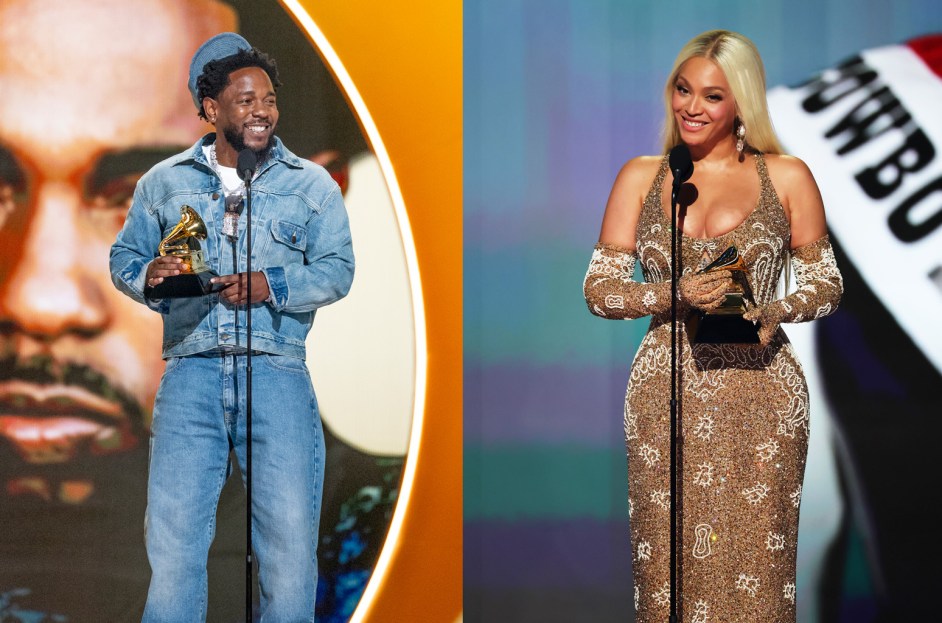
At Sunday night’s ceremony, the top prizes were won by Beyoncé and Kendrick Lamar.
Music’s biggest night wouldn’t be complete without, well, music — something the 2025 Grammys had in abundance with Sabrina Carpenter, Chappell Roan, Doechii and more stars delivering buzzy live performances in between the presentation of awards Sunday (Feb. 2).
The show kicked off with Dawes, Brad Paisley, John Legend, Sheryl Crow, Brittany Howard and St. Vincent paying tribute to Los Angeles — where the ceremony streamed live from the city’s Crypto.com Arena — with an all-star performance of Randy Newman’s “I Love L.A.” honoring victims and first responders affected by the disastrous wildfires in Southern California last month. The offering set the tone for the rest of the night, which featured numerous odes to the city and found host Trevor Noah continuously reminding the audience to donate via MusiCares to relief efforts; by the end of the night, viewers had contributed $7 million, the comedian revealed on air.
Trending on Billboard
More artists such as Billie Eilish and Lady Gaga then honored the City of Angels through their performances, with the former singing “Birds of a Feather” on a set made to look like Eaton Canyon in Altadena, and the latter recruiting her “Die With a Smile” collaborator Bruno Mars for an emotionally charged take on The Mamas and the Papas’ “California Dreamin.’”
There were also tributes to the artists we lost in the past year — led by Chris Martin, who sang “All My Love” on piano as the names of Liam Payne, Toby Keith and more late stars flashed on screen — and Quincy Jones, who died at 91 in November. In honor of the game-changing producer, Will Smith guided the audience through a string of performances from Cynthia Erivo, Lainey Wilson and Stevie Wonder with Herbie Hancock and Jacob Collier on piano, closing with Janelle Monáe channeling Michael Jackson on “Don’t Stop ’Til You Get Enough.”
Plus, viewers were treated to performances from all eight best new artist nominees, with Carpenter hamming it up for “Espresso” and “Please Please Please,” Roan — who later won the category — serving rodeo princess on “Pink Pony Club,” and Benson Boone, Doechii, Teddy Swims, Shaboozey and Raye all singing their biggest hits of 2024 back to back.
Elsewhere in the night, The Weeknd finally ended his beef with the Recording Academy and made his return to the Grammy stage, Shakira got Taylor Swift and more guests up and dancing, and Charli XCX closed the show with a Brat medley of “Von Dutch” and “Guess.”
With so much musical excellence packed into one night, it might be hard to choose, but Billboard still wants to know which artist delivered your favorite performance at this year’s Grammys. Cast your vote below.
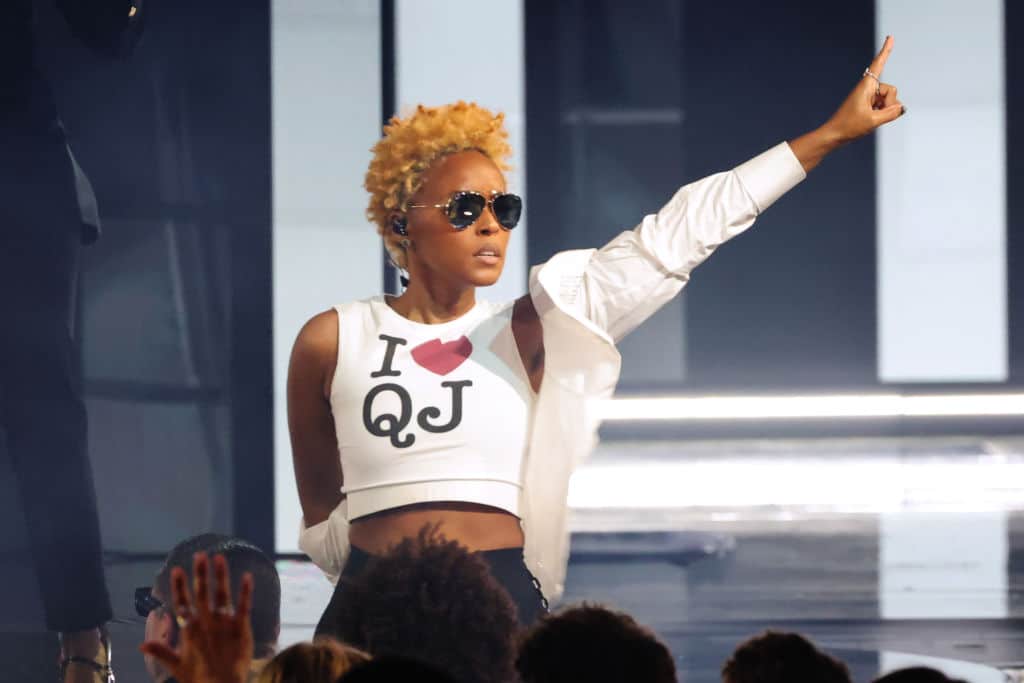
HipHopWired Featured Video
CLOSE
Source: Kevin Winter / Getty / Janelle Monáe
We all love Janelle Monáe, and when it comes to performances, she is always on point, but if you checked social media last night, her impersonation of Michael Jackson during the tribute for the late Quincy Jones was a rare miss.
The talented multi-hyphenate and 10-time Grammy-nominated artist took on the task of performing Michael Jackson’s iconic record “Don’t Stop’ Til You Get Enough,” a song produced by Jones as part of the tribute that also featured performances from Stevie Wonder, Cynthia Erivo, and more.
Jones has won 28 Grammy Awards throughout his career, and his most recent win came in 2018 for Best Music Film category for the short Quincy.
Will Smith, who worked with Jones on the Fresh Prince of Bel-Air sitcom, ended his awards show hiatus after the slap heard around the world to introduce the segment.
Monáe had MJ’s signature look down, rocking a sparkly tuxedo that would have made him proud, complete with bedazzled socks and penny loafers.
She also had the dance moves down, flawlessly executing the moonwalk, which got a massive rise out of the crowd, before taking off her jacket, revealing an “I [heart] QJ” t-shirt honoring the producer who passed away on Nov 3, 2024, at age 91 and chucking into the crowd where Taylor Swift caught it and proceeded to wear it.
https://x.com/StopYoureLosing/status/1886264801237549496
Social Media Had Thoughts About Janelle Monáe’s Performance
The performance impressed some viewers. “Janelle Monáe the PERFORMER. PLEASE PUT RESPECT ON HER NAME,” one post on X, formerly Twitter, read.
https://x.com/mmpadellan/status/1886259387708113160
Sadly, many thought Janelle Monáe didn’t stick the landing with her performance.
“Fuck Janelle Monae. That shit was trash, disgusting, and disrespectful. How dare you go up on that stage and perform a song by a legend after disrespecting him and his family the way you did. You need Cheryl Porter and Paula to teach you some things about choreo and vocals,” one angry viewer said on X.
Well damn.
https://x.com/0nlyFoxx/status/1886259414111305916
If you ask us, the performance was satisfactory; you can see more reactions in the gallery below.
2. Damn, sounded like a good choice to us
4. Someone enjoyed it
5. Lol, damn, not the Beyoncé
12. Beyoncé liked it
During the 2025 Grammys red carpet Sunday (Feb. 2), one reporter got a little caught up in the femininomenon of Chappell Roan while speaking to Babyface.
In a viral clip of the awkward exchange, the “When Can I See You” singer — looking dapper in a jewel-encrusted suit jacket and black shades — is only a few words into his answer to a question while speaking to The Associated Press when the 26-year-old pop star walks by behind him. At that point, one of the AP’s reporters calls out to get Roan’s attention while Babyface is still speaking, prompting the R&B icon to stop in the middle of what he’s saying and ask, “You guys wanna do that?”
“Go do that,” Babyface adds, relinquishing his microphone as the “Hot to Go!” singer — appearing not to have heard the interaction — walks over.
Trending on Billboard
Shortly afterward, AP posted an apology on X. “We are deeply sorry for cutting our interview with Babyface short on our YouTube livestream of the Grammys red carpet,” the news agency wrote in its statement. “We have apologized to him through his representative and to our viewers on the livestream.”
Billboard has reached out to Babyface’s rep for comment.
As evidenced by the commotion on the carpet, Roan was one of the buzziest guests at the 2025 ceremony. The star walked in with six nominations total, including for song, record and album of the year for “Good Luck, Babe!” and The Rise and Fall of a Midwest Princess, respectively. Though she didn’t take home any of those Big 3 awards — Kendrick Lamar’s “Not Like Us” won both song categories while Beyoncé’s Cowboy Carter scored AOTY — the Missouri native did win best new artist.
And during her speech, she boldly challenged record labels to take better care of their artists, especially signees. “I told myself if I ever won a Grammy and I got to stand up here in front of the most powerful people in music, I would demand that labels and the industry profiting millions of dollars off of artists would offer a livable wage and healthcare, especially for developing artists,” Roan said while accepting best new artist. “Labels, we got you — but do you got us?”
Elsewhere in the night, the star performed her Billboard Hot 100 top 40 hit “Pink Pony Club,” taking the stage atop a giant pink horse prop while surrounded by dancers in clown makeup.
But before the ceremony even started, AP’s Krysta Fauria also issued a personal apology to Babyface before the site’s red-carpet coverage ended. “I wanted to say that I’m really sorry about interrupting Babyface earlier,” she said in a clip from the broadcast. “I’m a big Babyface fan — as are we all — and so I just wanted to say that I really apologize.”
It’s common practice for artists to thank their families when winning major awards. But, as rock star St. Vincent proved at the 2025 Grammys on Sunday (Feb. 2), it’s rare to see artists reveal that they’re married with kids during a massive event.
During the evening’s pre-telecast awards, Annie Clark (St. Vincent’s offstage name) took home the best rock song trophy for her 2024 single “Broken Man.” During her acceptance speech, the singer surprised fans and audience members by offering a special shout-out to “my beautiful wife Leah [and] our beautiful daughter.” In a later acceptance speech for best alternative music album for her 2024 LP All Born Screaming, Clark thanked her family for a second time.
Clark is known for remaining tight-lipped about her personal life, a fact that she acknowledged in a backstage interview after winning her award. When a reporter from the Associated Press said that they were “totally unaware” of Clark’s marital status, the singer jumped in to add that “most people were,” revealing that she and her spouse have made a concerted effort to keep their relationship out of the public eye.
Trending on Billboard
“She’s young, we’ve kept it under wraps,” she said, before quickly clarifying her point with a laugh. “The child is young, just to be clear, the child is young, not the wife!” The singer added that she and her family had plans to celebrate her victory with her sisters, but that Clark intended “to be in bed by 10” that night.
Elsewhere in her backstage interviews, Clark reflected on the LGBTQ+ representation at the annual show and across the industry, remarking that queer people existing in the industry and the world at large is not news. “There have always been queer people in the history of the world, and especially in music,” she said. “There’s a bunch of queer people being celebrated this year. And that’s great, of course it’s great — empathy and humanity, let’s go.”
For Billboard‘s 2024 Pride cover story, the singer opened up about the history of queer people in the music business, while pointing out the importance of LGBTQ+ artists remaining on the cutting edge of culture. “There have been plenty of queer people in music. Even if the culture was saying no, there were always queer people in the arts. Please. We have built this,” she said at the time. “If you’re safe for the TV screen, you also invite an aspect of grift [from the outside world]. Which … I raise an eyebrow at.”
The All Born Screaming singer took home three trophies at Sunday night’s ceremony — best rock song, best alternative music album and best alternative music performance for “Flea.” Clark was nominated in the best rock performance category, but ultimately lost out to the Beatles’ AI-assisted track “Now and Then.”

 State Champ Radio
State Champ Radio 